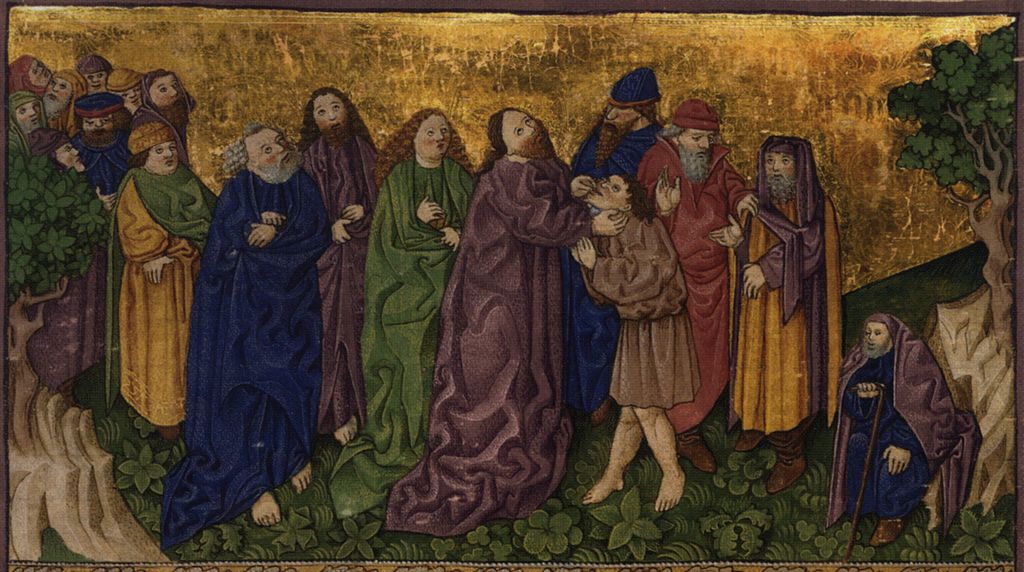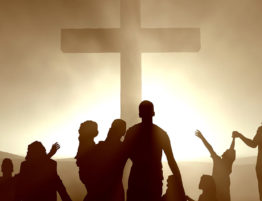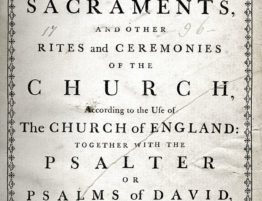
Text: Luke 11:14-28 , Deuteronomy 6:1-9, 20-25; Ephesians 5: 1-14
As most of you know, several of us from All Saints and our sister parishes Three Streams and Covenant Anglican Churches began this year’s Lent on pilgrimage in the Holy Land, following the footsteps of our Lord. This was not my first time to Israel; I had previously visited the Land in January of 2006 with our late friend Ron Dodds. This year’s trip was quite different, however, to the point of feeling like a brand new visit much of the time! One of the few places I visited both times, though, was the site of Jesus casting out Legion from the demoniac into the herd of pigs. At the ruins of a Byzantine-era church on the site, Fr. Chris gave us a good lesson about the fight against Satan. Indeed, a significant part of Jesus’ earthly ministry was the driving out of demons from those whom they oppressed.
In today’s Gospel for the third Sunday in Lent, we see Jesus in the middle of this aspect of his ministry. Please turn in your bibles to Luke 11:14, which can also be found in your Prayer Book on Page 129:
Now Jesus was casting out a demon that was mute. When the demon had gone out, the mute man spoke, and the people marveled. But some of them said, “He casts out demons by Beelzebul, the prince of demons,” while others, to test him kept seeking from him a sign from heaven. But he, knowing their thoughts, said to them, “Every kingdom divided against itself is laid waste, and a divided house falls. And if Satan also is divided against himself, how will his kingdom stand? For you say that I cast out demons by Beelzebul. And if I cast out demons by Beelzebul, by whom do your sons cast them out? Therefore they will be your judges.
I don’t know about you, but I’ve often read this passage and wondered how folks could ever think that Jesus used the power of Satan to cast out demons! After all, why would the devil cast out devils? It makes no sense. This is, of course, why Jesus responded with his statement about a divided kingdom being laid waste and a divided house falling.
But for many of the people of Jesus’ day, including otherwise devout Jewish people, using Satan’s power against demonic forces fit well within their more magical worldview. The extrabiblical literature of the 2nd Temple period has numerous accounts of exorcisms, all of which involve some sort of talisman, incantation, or magic ritual. The essence of this view of magic, whether it’s sorcery, witchcraft, or paganism, is that the magician must know the right secret formula to have manipulative power over the evil spirit. So, what better way to have power over demons than to be able to manipulate them by their prince, Satan? In short, Jesus is being accused of practicing black magic, an accusation that could get him executed under the Law of Moses.
Jesus not only points out the lack of common sense in this accusation, but he turns it right around. “If I cast out demons by Beelzebul, by whom do your sons cast them out?” If Jesus is supposedly practicing black magic, what do his accusers have to say about their own exorcists? By relying on talismans, incantations, and ritual magic, Jesus’ accusers themselves are showing that they are the ones who have idolatrous hearts.
We also have, in this story, those who were seeking for a sign from heaven, even as Jesus was already giving them a sign in the healing of the demon-oppressed mute man! St. Cyril of Alexandria points out that this is the same kind of wickedness that led the other folks to accuse Jesus of casting out demons with the power of Satan. He writes:
Being stung by envy, they required seeing him work a sign from heaven. They called out, as it were, and said “Even if you have expelled from a man a bitter and malicious demon, that as yet is no such great matter, nor worthy of admiration. What is done up to now is no proof of divine ability.”
What a terrible display of hardness of heart! What a dreadful example of spiritual blindness! We can certainly look at both of these groups of doubters – the ones who think he’s empowered by Satan, and the others for whom no sign is good enough – we can certainly look at these folks and shake our heads in bewildered pity.
But even as Christians we can easily fall into similar wrongheadedness. How often do we think that we can find just the right prayer or just the right actions to ensure that God will bless us the way we want to? Anyone remember the little book The Prayer of Jabez from about 20 years ago? Or how about The Secret? Or how many Christians follow their horoscopes as if the stars and planets control our personalities and destinies rather than the One who made the stars and planets? How often do we beg God for a special sign when making a big decision as if God is playing a shell game to trick us into misfortune? How easy is it for Christians to become just as superstitious as any other people!
On the other hand, perhaps we’re so rational that we don’t seek God at all, but figure that we can handle everything perfectly fine on our own, thank you very much! We figure we’re in control and don’t need to spend time in prayer or in God’s word. How easy it is to trust in or own smarts, money, or power.
Either way, we’re committing the same sins as the folks in this pericope: trusting in something other than God. We are, in short, being idolatrous.
Jesus, however, sets both them and us straight. Verse 20:
But if it is by the finger of God that I cast out demons, then the kingdom of God has come upon you. When a strong man, fully armed, guards his own palace, his goods are safe; but when one stronger than he attacks him and overcomes him, he takes away his armor in which he trusted and divides his spoil. Whoever is not with me is against me, and whoever does not gather with me scatters.
St. Cyril identifies the “finger of God” in this passage with the Holy Spirit. That is, God himself is the one who is empowering Jesus’ mission, even as Jesus is also God. And it is God himself who is bringing God’s kingdom. It was not the piety of the 1st Century Jews that brings in God’s kingdom, nor is it our piety that brings the Kingdom today. Nor is it by the methods of the World, Flesh, or Devil that we overcome them to make this world a better place. Rather, God himself is the one who has conquered the World, the Flesh, and the Devil by the blessed passion and precious death, by the mighty resurrection and glorious ascension of our Lord Jesus Christ.
This is why it is so essential to become united with Christ. Christ is not merely one of many religious options; he is the only one who can usher in God’s kingdom. And he continues to do this by the “finger of God” in the ministry of the Holy Spirit. It is the Holy Spirit who gives new life in conversion and baptism. It is the Holy Spirit who quickens faith within us. It is the Holy Spirit who brings us Christ’s Body and Blood in the Eucharist. It is the Holy Spirit who speaks through God’s Word proclaimed and preached. Christ, by the Holy Spirit, is the “stronger man” who conquers the “strong man” of the World, the Flesh, and the Devil. It is Jesus who has vanquished the unclean spirit.
Jesus goes on to give a warning about what can happen if the unclean spirit is allowed to return. Verse 24:
When the unclean spirit has gone out of a person, it passes through waterless places seeking rest, and finding none it says, ‘I will return to my house from which I came.’ And when it comes, it finds the house swept and put in order. Then it goes and brings seven other spirits more evil than itself, and they enter and dwell there. And the last state of that person is worse than the first.
In my experience, there is no one more miserable than a former Christian. No matter how good life seems on the outside, I’ve noticed that all of the backslidden or apostate Christians I know have a constant edge of anger, bitterness, and general unhappiness. In my estimation it is better to be a pagan than to be an apostate. It’s better to have never come to Christ’s table than to partake and later reject it.
Of course, we all have little times of backsliding from time to time. And by God’s grace, we can be restored. As we read in Article XVI, Of Sin After Baptism:
Not every deadly sin willingly committed after Baptism is sin against the Holy Ghost and unpardonable. Wherefore the grant of repentance is not to be denied to such as fall into sin after Baptism. After we have received the Holy Ghost, we may depart from grace given, and fall into sin, and by the grace of God we may arise again, and amend our lives. And therefore they are to be condemned which say, they can no more sin as long as they live here, or deny the place of forgiveness to such as truly repent.
In St Matthew’s parallel passage to today’s Gospel reading, Jesus addresses the unpardonable sin against the Holy Spirit. This is a concept that is terrifying for many Christians because they wonder what the unpardonable sin is, and whether or not they’ve committed it! If that’s you, don’t worry: you wouldn’t be asking the question if you had! The sin against the Holy Spirit is hardening your heart to the point where you will not listen to his call to repentance. The Church always puts out that call to repentance. The Spirit always speaks in the Word and Sacrament. The danger is a heart that’s been hardened to the point where that call and voice make no difference. That’s the danger of backsliding and falling into sin: in the early stages it looks exactly the same as apostasy.
This is why our Epistle passage from Ephesians 5 lays out the difference between following God, walking in love, as children of light, and in the fruit of the Spirit versus the deeds of darkness in sexual immorality, covetousness, foolish speech, idolatry, and impurity. As the passage concluded, “Awake, thou that sleepest, and arise from the dead, and Christ shall give thee light.” Those deeds of darkness are opening doors for the unclean spirit to return with his seven buddies.
Similarly, in the starred Old Testament lesson from Deuteronomy 6 for Morning Prayer, we see passage known in Jewish circles as the Shema, where we get the first part of the Summary of the Law:
Hear, O Israel: The LORD our God, the LORD is one. You shall love the LORD your God with all your heart and with all your soul and with all your might. And these words that I command you today shall be on your heart. You shall teach them diligently to your children, and shall talk of them when you sit in your house, and when you walk by the way, and when you lie down, and when you rise. You shall bind them as a sign on your hand, and they shall be as frontlets between your eyes. You shall write them on the doorposts of your house and on your gates.
This passage speaks of the benefit of dwelling in God’s Word. Camp out in the Bible. When God’s very words are taking up most of your life’s real estate, it’s harder for the World, the Flesh, and the Devil to muscle in. When we were in Israel, it was common to see that last verse applied quite literally with the Mezuzzah boxes on many doors, and Jewish men praying with Tefillin boxes tied to their heads and arms, each containing bits of Scripture. God’s words were literally bound to their hands, between the eyes, and written on the doorposts. Yet without the indwelling of the Holy Spirit and union with Jesus the Messiah, these practices amount to little more than a talisman. The same is true for our Lenten devotionals, fasting, and other practices. But when God’s Word is written on our hearts by the Holy Spirit, these acts of piety help to transform us into Christ’s likeness. They become part of the ordinary means of grace.
In our Collect we prayed that God would “look upon the hearty desires of [his] humble servants, and stretch forth the right hand of [his] Majesty, to be our defense against all our enemies, through Jesus Christ our Lord.” This Lent, may the ministry of Word and Sacrament give us godly, hearty desires. May we see God’s finger, his right hand, bringing his majestic kingdom upon us. Indeed, it is only by his might and power that we can be defended against the enemy of our souls. After all, it is our Lord Jesus who is the Stronger Man, conquering his and our foes.
In the Name of the Father and of the Son and of the Holy Ghost. Amen.




